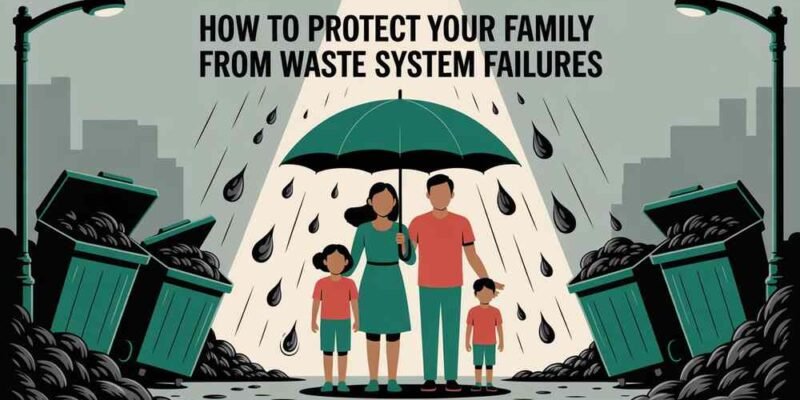Waste system failures pose serious health, safety, and home value risks. Whether you rely on a municipal sewer line or a private septic tank, understanding the threats and learning how to prevent failures is critical. This blog includes warning signs, causes, and maintenance essentials for safeguarding your home and loved ones.
Why Waste System Failures Are a Significant Concern
Wastewater systems quietly protect your household by removing dangerous contaminants. But when these systems break down, sewage can return to the home or leak into the yard, creating significant health risks and expensive repairs. Failures can also lead to bacterial growth, water contamination, and unpleasant odors. Early awareness and actions play a pivotal role in reducing these dangers.
Knowing the Types of Waste Systems
Municipal Sewer Systems
Most urban areas are connected to centralized municipal sewer systems, which transport wastewater from homes to treatment facilities. Cities maintain main lines, but homeowners remain responsible for the lateral lines running from the house to the street. Blockages or breaks in these lines can result in wastewater backup.
Septic Systems
In rural and suburban areas, Septic systems require proper maintenance to operate efficiently. They include a buried tank and a drain field. Solid waste can accumulate and cause system failures without regular inspections and cleaning.
Key Causes of Waste System Failures
Flushing Inappropriate Items
Items like wipes, feminine products, diapers, and paper towels do not break down easily and can clog pipes. Even products marketed as “flushable” can create blockages over time.
Lack of Routine Maintenance
Neglecting regular inspections and pumping appointments leads to solid waste buildup and overflow. Scheduling consistent cleaning helps avert unexpected emergencies.
Tree Root Intrusion
Roots naturally seek moisture and can infiltrate sewer and septic lines, causing cracks and damaging pipes. Tree root blockages are a leading cause of wastewater leaks and backups.
Heavy Rainfall and Flooding
Excess moisture saturates the surrounding soil, especially around septic drain fields, making it difficult for the system to filter and process waste properly. Flooded systems become prone to backup and contamination.
Warning Signs Your Waste System May Be Failing
Slow Drains
If sinks, showers, or tubs drain slowly, it could signal a blockage or problem within your plumbing or waste system.
Unusual Odors
Sewage smells around drains or yards indicate that waste may not be correctly processed or contained.
Patches of Lush Grass or Standing Water
Unusually green grass or pooling water in your yard near sewage lines suggests leaking, which lets untreated wastewater reach the surface.
Gurgling Sounds From Pipes
If you hear consistent bubbling or gurgling, especially after flushing or draining, a blockage or systemic issue may occur.
Steps for Preventing Waste System Failures
Schedule Regular Inspections
Professional inspections can catch minor issues before they become significant problems. For homeowners with septic tanks, scheduling septic tank cleaning in Salt Lake City helps prevent buildup and keeps your system running smoothly.
Be Mindful of What Goes Down Your Drains
Avoid flushing non-biodegradable items or pouring grease and chemicals down your sink. Even small doses of fat or paint can create buildups that impede your system’s efficiency.
Conserve Water
Using less water reduces overall stress on your waste system. Install water-efficient fixtures, spread out laundry loads, and address leaks promptly to help avoid overload.
Manage Landscaping Wisely
Keep trees and bushes away from waste system components to deter roots from damaging pipes. If planting new greenery, consult a local expert to plan safe distances.
Stay Prepared for Weather Extremes
During periods of heavy rain, minimize water usage to decrease the burden on your system. Clearing gutters and properly grading your yard keeps excess water away from drain fields.
What to Do if Your System Shows Signs of Failure
Should you notice any symptoms of waste system issues, address them immediately. Turn off water use in affected areas, avoid the impacted space, and contact a qualified professional for assessment and repairs. Delaying responses can escalate minor concerns into major (and costly) disasters.
Protecting Your Home and Health
Vigilant care and preventative action are essential for avoiding the stress and hazards of waste system failures. By staying informed about risks, maintaining your system, and knowing when to seek help, you safeguard your family’s health and the value of your property.
Do Read: Language as Heritage: Samir Salih on Dialects, Identity, and Power













